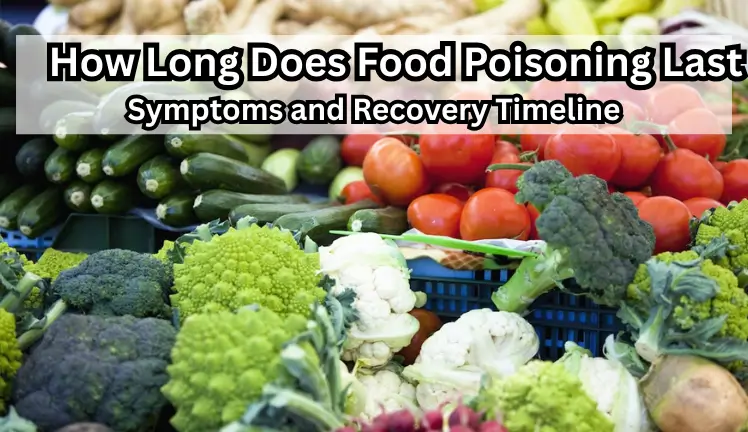How Long Does Food Poisoning Last?
Food poisoning is a common illness caused by consuming contaminated food or drinks. It can occur after eating food contaminated with bacteria, viruses, parasites, or toxins. While it can cause discomfort and distress, most cases of food poisoning are self-limiting and resolve on their own. However, the duration of food poisoning can vary depending on the cause, severity, and the individual’s overall health.

How Long Does Food Poisoning Last?
The duration of food poisoning generally depends on the type of pathogen responsible for the illness. Here’s a breakdown of how long food poisoning typically lasts based on the cause:
- Bacterial Food Poisoning:
- Salmonella, E. coli, and Campylobacter infections are among the most common bacterial causes of food poisoning. Symptoms may last from 1 to 7 days, depending on the bacteria and the severity of the infection.
- Viral Food Poisoning:
- Norovirus is a common viral cause of food poisoning. Symptoms usually appear within 12 to 48 hours and may last from 1 to 3 days. Other viruses, like rotavirus, can cause food poisoning that lasts about 2 to 3 days.
- Parasitic Infections:
- Infections caused by parasites, such as Giardia or Toxoplasma, can lead to longer-lasting symptoms. These infections may persist for 1 to 2 weeks or even longer if not treated.
- Toxin-Induced Food Poisoning:
- Staphylococcus aureus and Clostridium botulinum are bacteria that release toxins into food, causing rapid and severe symptoms. This type of food poisoning may last anywhere from 24 hours to 3 days.
Symptoms of Food Poisoning
The symptoms of food poisoning vary depending on the type of pathogen but typically include:
- Stomach cramps
- Diarrhea (sometimes bloody)
- Vomiting
- Nausea
- Fever (in some cases)
- Headache
- Fatigue
These symptoms typically appear within hours or a few days after consuming contaminated food. Severe cases of food poisoning may require medical attention, especially if dehydration, high fever, or persistent symptoms occur.
Recovery Timeline for Food Poisoning
The recovery process for food poisoning varies depending on the individual and the pathogen involved. In most cases, mild food poisoning can resolve within a few days with rest, hydration, and over-the-counter treatments to manage symptoms.
Here’s an overview of what to expect during recovery:
- Mild Cases:
- If the food poisoning is mild, recovery usually happens within 1 to 3 days. Staying hydrated and eating a bland diet can help ease symptoms.
- Moderate to Severe Cases:
- If food poisoning is more severe, symptoms like persistent vomiting, severe diarrhea, or high fever may last longer, from 3 to 7 days. In such cases, it’s essential to seek medical attention to prevent complications like dehydration.
- Chronic Cases:
- If left untreated or if caused by a parasite, food poisoning could lead to longer recovery times, possibly up to 2 weeks or more. In these cases, medical treatment and medications are often required to clear the infection.
What to Do During Recovery
If you suspect food poisoning, here’s what you can do to help manage your symptoms and aid recovery:
- Hydration:
- Drink plenty of fluids like water, oral rehydration solutions (ORS), or clear broths to replace lost fluids and prevent dehydration.
- Eat a Bland Diet:
- Stick to easy-to-digest foods like toast, rice, bananas, and applesauce. Avoid spicy, greasy, or dairy foods until your symptoms subside.
- Rest:
- Allow your body to rest and recover. Avoid strenuous activities and focus on staying comfortable.
- Over-the-Counter Medications:
- Medications like anti-diarrheal drugs (e.g., loperamide) can help control symptoms, but be cautious, as they may not be suitable for all types of food poisoning. Consult your doctor before using them.
- Seek Medical Attention:
- If symptoms persist for more than a few days, or if you experience severe dehydration, high fever, bloody stools, or severe pain, seek medical attention immediately.
When to See a Doctor
You should seek medical help if:
- You experience significant dehydration (dry mouth, dizziness, reduced urine output).
- You have a high fever (above 101.5°F or 38.6°C).
- You notice blood in your stool or vomit.
- You have symptoms that last more than 3 days.
Preventing Food Poisoning
While it’s not always possible to avoid food poisoning, you can reduce the risk by following these food safety tips:
- Wash your hands thoroughly before eating or handling food.
- Cook food to the recommended temperature to kill harmful bacteria.
- Store perishable food properly and avoid eating food that’s been left out too long.
- Practice safe food handling to prevent cross-contamination in the kitchen.
- Read Also:
- Benefits of Eating Fruits Everyday for Skin: Natural Glow, Hydration & Youthful Look
- 9 Incredible Health Benefits of Soaked Watermelon Seeds You Should Know
- 10 Superfoods for Hair Growth: Eat Your Way to Stronger, Healthier Hair
Conclusion
Food poisoning, while uncomfortable, typically resolves within a few days, depending on the cause and severity. Mild cases usually last from 1 to 3 days, while more severe infections may take up to 7 days or longer to recover from. By staying hydrated, eating bland foods, and getting proper rest, most people can recover at home. However, in severe cases, it’s important to seek medical care to avoid complications.
Disclaimer: The information provided in this article is for general informational purposes only and is not intended as medical advice. Please consult a healthcare professional for personalized guidance and treatment.
Admin at Sirfal.com – Experienced blogger since 2015, sharing Q&A content and latest job updates.